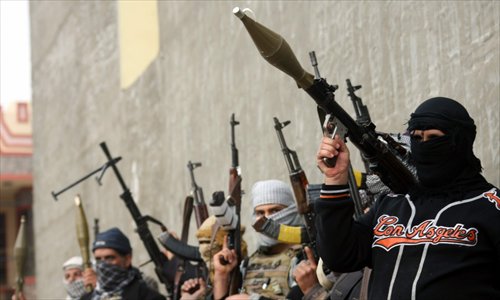New terror in Iraq

Sunni fighters carry RPGs and machine guns as they take up position in Fallujah city, western Iraq, January 5, 2014. Photo: CFP
The recent unrest in Iraq, which has lasted for more than a month since a jihadist group took control of Fallujah, the key strategic town in Anbar province, continues as sectarian conflicts escalate.
Islamic State in Iraq and the Levant (ISIS) took control of Fallujah from the Iraqi government after several days of fierce fighting according to an AFP report on January 4. This is the first time since the US incursion into Iraq in 2003 that armed factions have controlled a key city so openly.
Iraqi Prime Minister Nouri al-Maliki vowed on January 4 to fight with the extremists to the end.
Fallujah was not the only target for ISIS. According to Reuters, in recent months, ISIS was gradually tightening its control upon Sunni-dominated Anbar province. Their larger goal was to establish a Sunni Muslim country, stretching across the border into Syria.
Deputy Minister of Iraq's Interior Ministry Adnan al-Asadi claimed on January 20 that the weapons that were brought inside Fallujah are huge, advanced and frankly enough to occupy Baghdad, according to AP reports.
Terrorist resurgence
Fallujah, as the key strategic city for the US in the Iraq War (2003-11), twice suffered attacks at the start of the conflict. The US Army said they were the most violent military clashes they had ever seen since Vietnam War.
At the end of 2006, with aid from Sunni tribal militants, the US Army barely retook control of Anbar province from terrorists during a period of ongoing attacks. Fallujah was arguably the base of anti-US terrorist forces as the number of deaths in Anbar province was one-third of the total number of US troop fatalities in the Iraq War.
Anbar province, which borders Syria and Jordan, is a large desert area in Iraq where most of the residents are Sunni Muslim.
After the end of Saddam Hussein's regime, with the rise of Shiites, Sunnis were excluded from the power center of Iraq, which intensified sectarian conflict.
Power shift
As Li Shaoxian, vice director of China Institutes of Contemporary International Relations, told the Global Times, the deeply rooted reason for the current conflict in Iraq was the overturn of the original political structure.
"The original political structure was pyramidal. Sunnis, the minority of the population, dominated domestically and Shiites, the vast majority, were at the foundation of the pyramid," Li said.
"After the Iraq War, which overturned the Saddam Hussein regime and carried out democratic elections, the pyramid was inverted and Shiites took the dominant position."
"The former leading Sunnis, only 20 percent of the population, did not accept the inverted pyramid-style political structure, which caused the 10-year unstable situation in Iraq following the start of the Iraq War," Li noted.
According to Dong Manyuan, deputy director of the China Institute of International Studies, there are several reasons for the resurgence of Al Qaeda in the Middle East.
First, it was unlikely for the US to continue its input of resources in the region after the withdrawal of its troops, which created an environment for the resurgence of Al Qaeda. In distributing their limited resources, the US have mainly concentrated on rebalancing the Asia-Pacific region, hence a vacuum appeared in the Middle East that facilitated the vigorous resurgence of Al Qaeda.
Second, the unstable situation in other countries in the region, including Egypt and Yemen, distracted the US from putting more energy into coping with the resurgence of Al Qaeda.
Third, the spillover of unrest in Syria greatly assisted the resurgence of ISIS in Iraq as it acted as a training ground for their leadership.
Regional war
The Christian Science Monitor reported on February 3 that Al Qaeda's leadership in Pakistan has apparently tired of limited direct coordination with ISIS. In fact, the leader of Al Qaeda in Pakistan, Ayman al-Zawahiri, has claimed in a letter published on jihadi forums that there has never been a relationship between Al Qaeda and ISIS.
According to Xinhua reports, ISIS, ignoring Al Qaeda's international goal of confronting the US and Israel, has paid more attention to regional enemies and starting regional war.
Prior to Al Qaeda in Iraq formally changing its name to ISIS last year, the leadership of Al Qaeda in Pakistan had some limited collaboration with them but Xinhua reported that direct cooperation had almost disappeared since 2006.
Li said that the disconnection with Al Qaeda would not affect ISIS significantly in the future, "after 9/11, Al Qaeda has become decentralized and localized."
"Branches scattered around different regions are all under the name of Al Qaeda, while in practice the relationship has been estranged after 9/11."
"The relationship of superior and subordinate does not exist in reality. At the same time, divergences of strategic concept exist."
Li noted that the unrest in Iraq would continue due to the deeply rooted sectarian conflicts and political reasons, regardless of whether or not ISIS is linked to Al Qaeda.